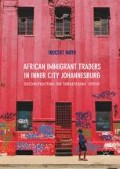Abstract
This chapter provides an introduction by outlining the framing of African immigrants as the threatening other- the problematic aliens in contemporary South Africa. This framing projects the African immigrants as only capable of importing a litany of problems that range from committing a host of crimes to the use of magical powers to cause other social problems. This chapter therefore probematises this construction of African immigrants and locates the book within these debates.
Access this chapter
Tax calculation will be finalised at checkout
Purchases are for personal use only
References
Castles, S., & Miller, J. (2009). The age of migration: International population movements in the modern world. Hampshire and New York: Palgrave Macmillan.
Crush, J. (2000). Migrations past: An historical overview of cross border movement in southern Africa. In D. A. McDonald (Ed.), On borders: Perspectives on international migration in Southern Africa (pp. 12–24). Southern African Migration Project: Ontario.
Crush, J. (2008). The perfect storm: The realities of xenophobia in contemporary South Africa. Migration Policy Series No 50. Cape Town: IDASA.
Crush, J., & Ramachandran, S. (2014). Xenophobic violence in South Africa: Denialism, Minimalism and Realism. Migration Policies Series No 66. Southern Africa Migration Project and International Migration Research Centre: Cape Town and Canada.
Daily Sun. (2008, May 9 ). They wait for darkness before they attack! Aliens use muthi to steal our cattle. p. 11.
Dyers, C., & Wankah, F. J. (2012). ‘Us and them’: The discursive construction of ‘the other’ in Greenmarket Square, Cape Town. Language and Intercultural Communication, 12(3), 230–247.
Geschiere, P. (2010). Autochthony: local or global? In U. Freitag & A. Von Oppen (Eds.), Translocality: The study of globalising processes from a Southern perspective (pp. 207–228). Brill: Lieden and Boston.
Gupta, A., & Ferguson, J. (2008). Beyond culture: Space, identity and the politics of difference. In T. S. Oakes & P. L. Price (Eds.), The cultural geography reader (pp. 60–67). London: Routledge.
Herbert, S. (2010). Contemporary geographies of exclusion: To assist or punish? Progress in Human Geography, 35(2), 256–263.
Iosifides, T. (2011). Qualitative methods in migration studies: A critical realist perspective. Surrey and Burlington: Ashgate.
Kalir, B. (2013). Moving subjects, stagnant paradigms: Can the ‘motilities paradigm’ transcend methodological nationalism? Journal of Ethnic and Migration Studies, 39(2), 311–327.
Landau, L. (2005). Immigration and the state of exception: Security and sovereignty in East and Southern Africa. Millennium Journal of International Studies, 34(2), 325–348.
Landau, L. (2008). Attacks on foreigners in South Africa: More than just xenophobia. Strategic Review for Southern Africa. University of Pretoria: Institute for Strategic Studies.
Landau, L. (2009). Living within and beyond Johannesburg: Exclusion, religion and emerging forms of being. African Studies, 68(2), 197–214.
Landau, L. (2010). Discrimination and development? Migration, urbanisation and sustainable livelihoods in South Africa’s forbidden cities. In J. Crush & B. Frayne (Eds.), Surviving on the Move: Migration, poverty and development in Southern Africa (pp. 66–79). IDASA and Development Bank of Southern Africa: Cape Town.
Landau, L., & Freemantle, I. (2010). Tactical cosmopolitanism and idioms of belonging: Insertion and self-exclusion in Johannesburg. Journal of Ethnic and Migration Studies, 36(3), 375–390.
Landau, L. (2011). Exorcising the demons within: Xenophobia, violence and statecraft in contemporary South Africa. Johannesburg: Wits University Press.
Landau, L. (2012). Focus should be on integration. Opinion, The Star, May 24, 2012:14.
Landau, L. (2013). Mobility, belonging and governance in Africa's urban estuaries. The Brown Journal of World Affairs, 20(2), 107–121.
Landau, L. Segatti, A. & Misago, J. P. (2013). Planning and participation in cities that move: Identifying obstacles to municipal mobility management. Public Administration and Development, 33, 113–124.
Landau, L. (2014a). Religion and the foundation of difference: Belief, transcendence and transgression in South Africa and Johannesburg. Global Networks, 14(3), 291–305.
Landau, L. (2014b). Conviviality, rights and conflict in Africa's urban estuaries. Politics and Society, 42(3), 359–380.
Malkki, L. (2008). National geographic: The rooting of peoples and the territorialisation of national identity among scholars and refugees. In T. S. Oakes & P. L. Price (Eds.), The cultural geography reader (pp. 275–282). London and New York: Routledge.
Massey, L. (2008). A global sense of place. In T. S. Oakes & P. L. Price (Eds.), The cultural geography reader (pp. 257–263). London: Routledge.
Neocosmos, M. (2006). From “foreign natives to native foreigners”, explaining xenophobia in post-apartheid South Africa: Citizenship and nationalism, identity and politics. Dakar: CODESIRA.
Neocosmos, M. (2008). The politics of fear and the fear of politics: Reflections on xenophobic violence in South Africa. Journal of Asian and African Studies, 43(6), 586–594.
Nyamnjoh, F. B. (2006). Insiders and outsiders: Citizenship and xenophobia in contemporary South Africa. Dakar, London and New York: CODESIRA and Zed Books.
Nyamnjoh, F. B. (2007). From bounded to flexible citizenship: Lessons from Africa. Citizenship Studies, 11(1), 73–82.
Nyamnjoh, F. B. (2010). Racism, ethnicity and the media in Africa: Reflections inspired by studies of xenophobia in Cameroon and South Africa. Africa Spectrum, 45(1), 57–93.
Papastergiadis, N. (2000). The turbulence of migration: Globalization, deterritorialization and hybridity. Cambridge: Polity Press.
Peberdy, S. (2009). Selecting immigrants: National identity and South Africa's immigration policies, 1910–2008. Wits University Press.
Statistics South Africa. (2003). Census 2001: Census in brief. Report no 03-02-03(2001). Pretoria: Statistics South Africa. www.statssa.gov.za/census01/html/CInbrief/CIB2001.pdf [Accessed 6 May 2014].
Statistics South Africa. (2012). Census 2011 Statistical release—P0301.4. Pretoria: Statistics South Africa. www.statssa.gov.za/publications/P03014/P030142011.pdf [Accessed on 6 May 2014].
Statistics South Africa. (2013). Mid-year population estimates. Statistical release P0302. www.statssa.gov.za/Publications/P0302/P03022013.pdf. [Accessed 11 May 2014].
The Sowetan. (2012, May 2). Foreigners do not benefit South Africa. p. 12.
Author information
Authors and Affiliations
Corresponding author
Rights and permissions
Copyright information
© 2017 The Author(s)
About this chapter
Cite this chapter
Moyo, I. (2017). The Framing of African Immigrants as the Problematic Aliens. In: African Immigrant Traders in Inner City Johannesburg. Palgrave Macmillan, Cham. https://doi.org/10.1007/978-3-319-57144-7_1
Download citation
DOI: https://doi.org/10.1007/978-3-319-57144-7_1
Published:
Publisher Name: Palgrave Macmillan, Cham
Print ISBN: 978-3-319-57143-0
Online ISBN: 978-3-319-57144-7
eBook Packages: Social SciencesSocial Sciences (R0)

